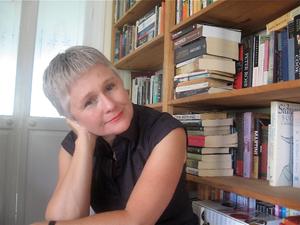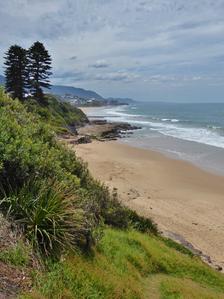
|
|
| photo: Nigel Beebe | |
Ashley Hay is the internationally acclaimed author of four nonfiction books, including The Secret: The Strange Marriage of Annabella Milbanke and Lord Byron, and the novels The Body in the Clouds and The Railwayman's Wife, which was honored with the Colin Roderick Award by the Foundation for Australian Literary Studies and longlisted for the Miles Franklin Literary Award, the most prestigious literary prize in Australia, among numerous other accolades. Hay lives in Brisbane, Australia, and recently spoke with us about the U.S. release of The Railwayman's Wife.
What inspired you to write this story?
I grew up one suburb up the train line from the book's setting, Thirroul, on Australia's eastern coast. It's a beautiful landscape, and I'd always wanted to set a story there. I also grew up with a grandmother who became the librarian at the Thirroul Railway Institute after her husband--my grandfather--was killed in a railway accident.

|
|
This story isn't their story--Ani and Mac are not real people--but I wanted to explore the idea of a widow in a compensatory job, and in a library, and just after the war. I think this was partly because my first novel--The Body in the Clouds--tried to tackle things on a large scale: a long span of time (more than 230 years); the colonization of a continent; the construction of a vast bridge; the size and speed of the modern world.
Even as I was writing that book, I was thinking about how I could try to explore big things--and war and grief would have to be two of the biggest--in smaller and more intimate ways, and how that different size and scale might change or direct a story. When I began, I found I didn't have a choice about where to set it: the landscape was a given.
What made you choose the library as Ani's emergency vocation?
I'd always known the story of my grandmother's life, but the moment I realized I wanted to try to imagine it as a novel was when I heard my dad talking, in the old library, about his own childhood memories of that place. In the middle of his talk, a train passed by outside, so very loud; so very close. I suddenly realized that my grandmother--or my character--would have lived and worked with the sound of the thing that had killed her husband, and that was when I decided I'd try to imagine this book.
And at a metaphorical level, I loved the library at the heart of the book. Like most writers, I think libraries are magical places, where you can enter so many stories, so many places--you can try on so many other lives. A large part of what my characters are trying to do is make sense of the world after war, after death, after change--they're trying to work out which stories to tell themselves about where they are, after where they've been. Having a library as the plot's focal point was a lovely way of bringing that to the front of the action.
I love that the characters have such passion for great poetry and literature.
In part it was about celebrating reading--as simple as that--and celebrating a time when many of our stories arrived textually rather than visually. In part, it was a very literal nod to that great Joan Didion quote: "We tell ourselves stories in order to live." That's true, isn't it? We use stories to explain ourselves to ourselves and to each other, and knowing what someone's reading often gives you an extraordinary shorthand about who they are, or allows you to form a different kind of connection with them.

|
|
What made you want to explore the topic of grief?
I've been fortunate enough to grow up in an era without a world war--I was born in 1971. But I have a kind of historical curiosity about big, global events, like WWI and WWII, and the way we tell their stories as if they had start and stop dates and clear delineations. I was interested in looking at how history bleeds into life--of course so many people died during WWII, but people died afterwards as well. Would their deaths be differently experienced, or accounted for, somehow, given that they happened beyond the sort of expectations of that happening in war?
The hardest part about writing the death of a husband was working against a very strong writerly superstition that by setting down these words I was somehow tempting fate. (My husband, I hasten to add, has nothing to do with railways.) It was a confronting thing to kill a perfectly lovely man on paper and then walk around with an uneasy sense of my own husband's safety for a good few weeks after that....
Tell us how Stephen Edgar's poetry came to play a role in the novel.
The poem that Ani finds is really the crux of the book, so it had to be a potent thing, a thing with power and authority. I'd written a poem in my drafts but it didn't really do the work it needed to do--I'm not a poet. At some stage my Australian publisher and I talked about finding a poet to write the poem. A friend suggested Stephen Edgar--who I'd never met--and when I read some of his work, I found a perfect epigraph for the novel from one of his earlier poems. That seemed a good sign.
 |
|
So I wrote one of the strangest e-mails I've ever written--explaining who I was, and what I was doing and what I needed, and Stephen said he'd give it a go. He asked me to send him the images from my poem that he'd really need to keep, and any notes I thought he might need. But he didn't want to read the manuscript.
I was at a writers' festival here in Australia when I got his poem, and I can remember opening the file and reading it on my phone--huge words on a tiny screen. I can remember bursting into tears. Because he'd caught so many of the ideas, the images, the sort of senses that I'd been trying to evoke in other parts of the book--without having read it. I felt as if I was hearing Roy's voice so clearly, and as if the whole book now had something solid at its heart.
What do you hope readers take away from this book?
The book tilts at vast things like war and the randomness of accidents and the mess we can make of being alive, but I think it's actually a book about love. There's a lovely line we've used on different editions about discovering that loving someone can be as extraordinary as being loved. That's always felt like a good, big thing to say. --Jaclyn Fulwood
photos by Janette Warren

